Category Archives: Information
Programs host event at ASU’s California Center
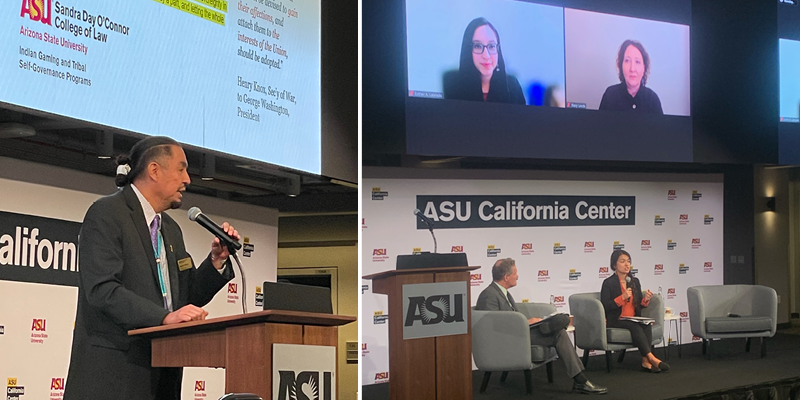
On June 23, the Indian Gaming and Tribal Self-Governance programs traveled to ASU’s California Center in downtown Los Angeles to present “Indian Law and Policy Now.” The community education event was held in the Yuhaaviatam of San Manuel Event Center and co-hosted by the programs and the Academy for Justice. We were delighted that Business Council Member at-large Laurena Bolden, of the San Manuel Band of Mission Indians, was able to provide opening remarks and a blessing to begin the event.
The morning session was hosted by ASU Law Director Derrick Beetso (’10) who presented on the “Foundations of Federal Indian Law and Policy” to help set the stage for the day’s discussion. This was followed by a dynamic panel, VAWA 2022: How We Got Here & Where We Came From. The panel was moderated by Academy for Justice Founder and FacultyDirector Erik Luna and panelists included Stacy Leeds , ASU’s Law’s Foundation Professor of Law and Leadership; Lauren Van Schilfgaarde, UCLA’s San Manuel Band of Mission Indians Tribal Legal Development Clinic director; and Esther Labrado, attorney at Drummond Woodsum.
This fascinating discussion tracked the history leading up to the historic tribal provisions in the 2013 Reauthorization of VAWA and the more recent expansions of those key provisions in the 2022 Reauthorization of VAWA which were passed and signed into law earlier this year.
The afternoon session closed with Director Beetso and two ILP Salt River Scholars, Noah Goldenberg (3L) and Sophie Staires (2L), summarizing recent proposals by the Bureau of Indian Affairs (BIA) affecting Indian lands and tribal gaming compacts. The BIA has hosted a series of consultations on these proposals and solicited comments from Indian tribes on a number of specific questions. Beetso, Goldenberg, and Staires provided important context for the recent actions, explained the consultation process, and provided broad responses and thoughts to many of the questions proposed by the BIA.
This event was made possible with the generous support of the San Manuel Band of Mission Indians, the Mohegan Tribe, the Shakopee Mdewakanton Sioux Community, and others.
The Aftermath of Castro-Huerta
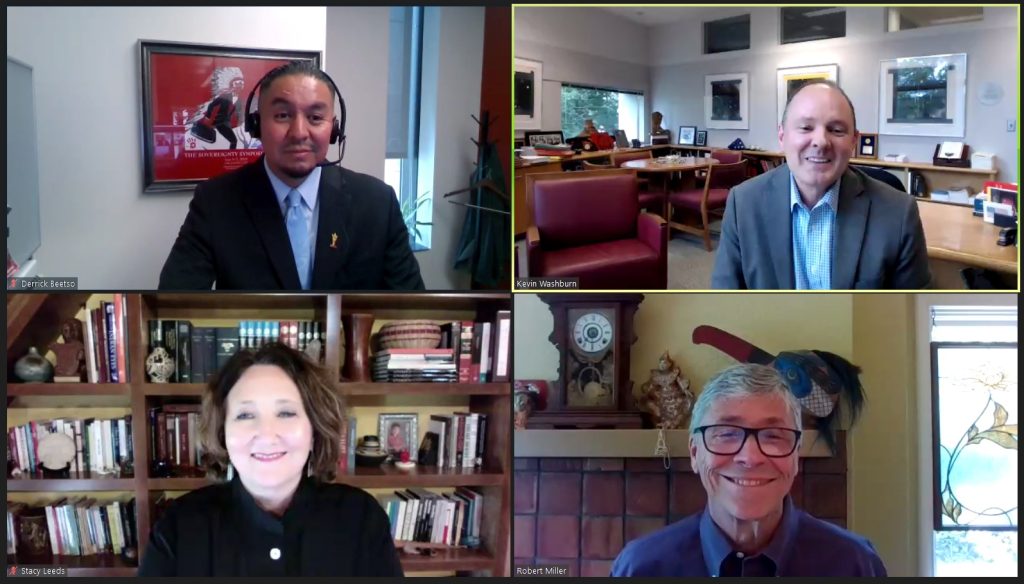
On July 7, ASU Law’s Indian Legal Program and Indian Gaming and Tribal Self-Governance programs hosted a virtual event – Oklahoma v. Castro-Huerta: Rebalancing Federal-State-Tribal Power.
Oklahoma v. Castro-Huerta is the most recent federal Indian law case decided by the U.S. Supreme Court and held that states share concurrent jurisdiction with the federal government in prosecuting crimes committed by non-Indians against Indian victims in Indian country. The majority decision, authored by Justice Brett Kavanaugh, departs significantly from earlier principles and precedent in this area and the panel discussed their thoughts on what this decision means on the ground for Indian tribes.
The event was moderated by Derrick Beetso (’10), Indian Gaming and Tribal Self-Governance Director, and included a fantastic lineup of Native leaders in academia: Kevin Washburn, Dean of Iowa Law School; Professor Stacy Leeds, ASU’s Foundation Professor of Law and Leadership; and Professor Robert Miller, ASU’s Willard H. Pedrick Distinguished Research Scholar and ASU Faculty Director of the Rosette LLP American Indian Economic Development Program.
The ILP and the Indian Gaming and Tribal Self-Governance programs thank each of our panelists for their time and for sharing their views on this case, and we thank all those who tuned in to listen to this discussion. If you missed the webinar, you may watch the recording.
On this topic, our expert faculty contributed to the national conversation happening in the media.
“Wednesday’s decision removes the jurisdictional boundaries of tribal sovereignty that have kept state and local police from entering tribal lands in some cases,” said Leeds to NBC News. Leeds’ legal expertise was also featured in KOSU, Reuters,Bloomberg Law and U.S. News & World Report.
“It will have an impact in Indian Country, so only the future will tell us if it’s good or not,” said Miller in an Associated Press news article. Miller also spoke to the Arizona Republic, saying: “Supreme Court rulings could weaken tribal jurisdiction and sovereignty.”
“Through this opinion, Kavanaugh rallied his cavalry of five to perform the modern version of slashing and burning peaceful Native communities and their resources and provisions to the ground,” Beetso wrote in his Indianz.com op-ed, “SCOTUS’ Decision in Oklahoma v. Castro-Huerta Departs Wildly from U.S. Constitution.”
Deadline Extended – Call for articles: Special Indian Law Edition of the Arizona Attorney 2022
Deadline for 1-2 Paragraph Article Proposals: February 7, 2022
Deadline for Article Drafts: March 18, 2022
The Indian Law Section has extended the deadline for article proposals to be included in the 2022 special Indian Law edition of the Arizona Attorney magazine. Proposals should focus on an issue of interest to those who practice Indian Law. Publication in the Indian Law Edition of the Arizona Attorney magazine is a wonderful opportunity for Indian legal practitioners to showcase their expertise in the field of Indian law. The Indian Law Section relies on you to contribute articles in order to preserve this outstanding tradition.
Past articles from the 2021 Indian Law edition were:
A View from Tribal Court: Tips for Best Practices
By M. June Harris
Thawing the Freeze: COVID-19’s Effect on the Former Bennett Freeze Area of the Navajo Nation
By Susan I. Eastman
The Words of the Talking God: Sustaining Native Nations Through the Common Law
By Joseph Austin
An Opportunity Arises: Prop. 207 and Arizona Tribes’ New Beginnings for Marijuana Legislation
By Judith Dworkin, Joe Keene, and Candace French
Epidemic Hiding in Plain Sight
By Susan Filan
Spectrum Sovereignty: The U.S. Must Recognize Indigenous Rights to Spectrum
By Darrah Blackwater
Arizona–Tribal 2021 Gaming Compact Amendments: What You Need to Know
By Heidi McNeil Staudenmaier and Ed Hermes
Bent But Not Broken – ICWA Stands: A Summary of “Brackeen v. Haaland”
By Glennas’ba Augborne Arents and April E. Olson
Either a short or a long article may be proposed. Generally, a long article will be between 2,000 and 2,500 words (in a Microsoft Word document, about 9 to 12 pages including endnotes) and will be about 3 to 4 pages in the magazine. A short article will be approximately 1,500 words and typically will be 2 pages in the magazine.
The proposal should provide the following information: author’s name and contact information (e-mail address, phone number, and name of employer/firm); the subject matter of the article (e.g., ICWA, NAGPRA, Water Rights, Land Use, Tribal Sovereignty, etc.); the anticipated title; and a concise summary of the thesis of the article.
Proposal authors will be notified on whether their proposed article has been accepted by February 11, 2022. The draft of the article for a selected proposal will be due on March 18, 2022. Final drafts of selected articles are due by April 25, 2022.
If you would like to submit a proposal or if you have questions, please contact:
Glennas’ba Augborne Arents, Secretary, Indian Law Section
gaugborne@rothsteinlaw.com
Or
Hon. M. June Harris, Member-at-Large, Indian Law Section
JHarris@sc.pima.gov
Inclusion on the bench
Representation in Arizona
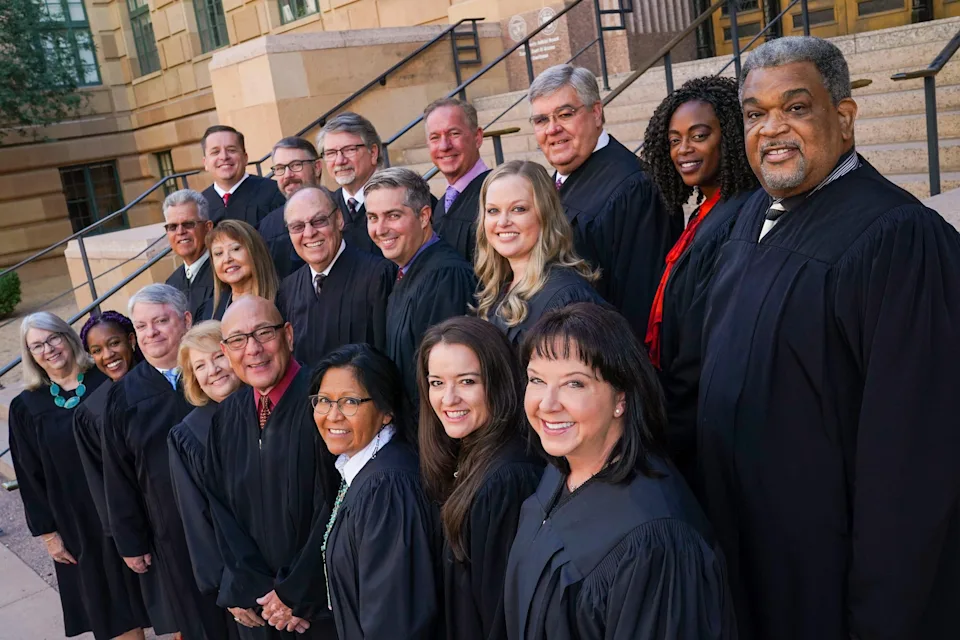
Of the 26 elected justices of the peace in Maricopa County, Judge Deborah Ann Begay (’10) is representing Indian Country in a big way! In January 2021, Begay made history by becoming the first Native American justice of the peace in Maricopa County and whose swearing in was administered by Navajo Nation President Jonathan Nez. After a full year sitting on the bench, she understands the need to serve and empower underrepresented communities.
“Because the judicial system has historically been ruled by cisgender white men, people may have biases against judges who do not look like they expect them to,” said Begay in an Arizona Republic article “Maricopa County Justice Courts lead way on representation.”
Your impactful service is so inspiring and we are proud of you, Judge Begay!
See more of Begay’s personal swearing-in ceremony in ILP blogpost Alumni: Taking the Oath in a Pandemic.
(Photo courtesy The Arizona Republic)
Success at the Ninth Circuit Court of Appeals for the Indian Legal Clinic
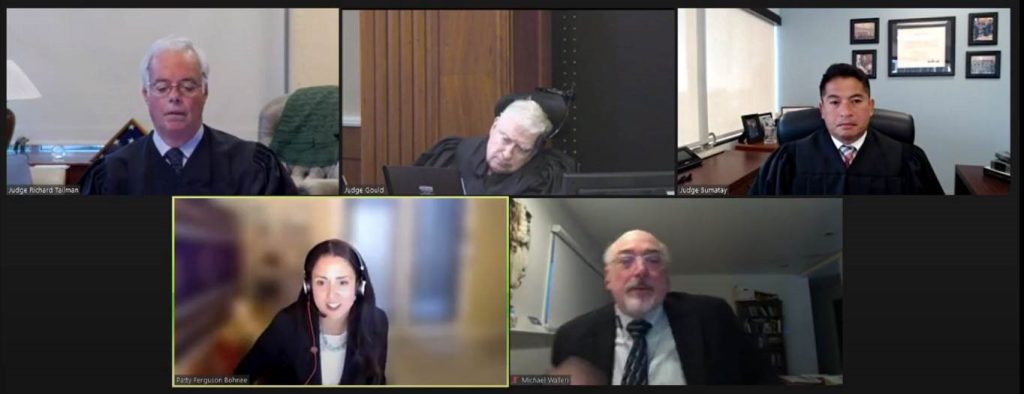
The Indian Legal Clinic represented the appellants in the United States Court of Appeals for the Ninth Circuit (Case no. 21-35230, Newtok Village v. Andy Patrick) in an appeal from the United States District Court for the District of Alaska that involved defending tribal sovereignty from unlawful intrusion by federal courts.
On behalf of their clients, the clinic appealed an adverse permanent injunction issued by the District Court of Alaska and argued that tribal sovereignty to resolve intratribal disputes prevents federal courts from intervening on such matters and that the District Court of Alaska lacked jurisdiction. On December 22, 2021, the Ninth Circuit unanimously agreed with the appellants’ arguments and vacated the district court’s orders. Judge Richard C. Tallman wrote the opinion, concluding, “Continuing to enforce the permanent injunction here risks the federal court’s impermissible involvement in interpreting the Tribe’s constitution and laws.”
Indian Legal Clinic Director Patty Ferguson-Bohnee argued the case before the Ninth Circuit Court of Appeals on November 9, 2021. Watch the recording of the oral argument. Vinnie Amato (3L) assisted with research. Native Vote Fellow Torey Dolan (’19) and Jens Camp (’21) assisted in drafting the briefs before the Ninth Circuit. Dolan provided notes for the oral argument preparation, and Native Vote Fellow Blair Tarman-Toner (’21) and Dolan assisted in preparing and refining Ferguson-Bohnee’s oral argument. The ILC collaborated with co-counsel James J. Davis, Jr. of the Northern Justice Project LLC in Anchorage, Alaska.
Native Vote
Mapping the next election
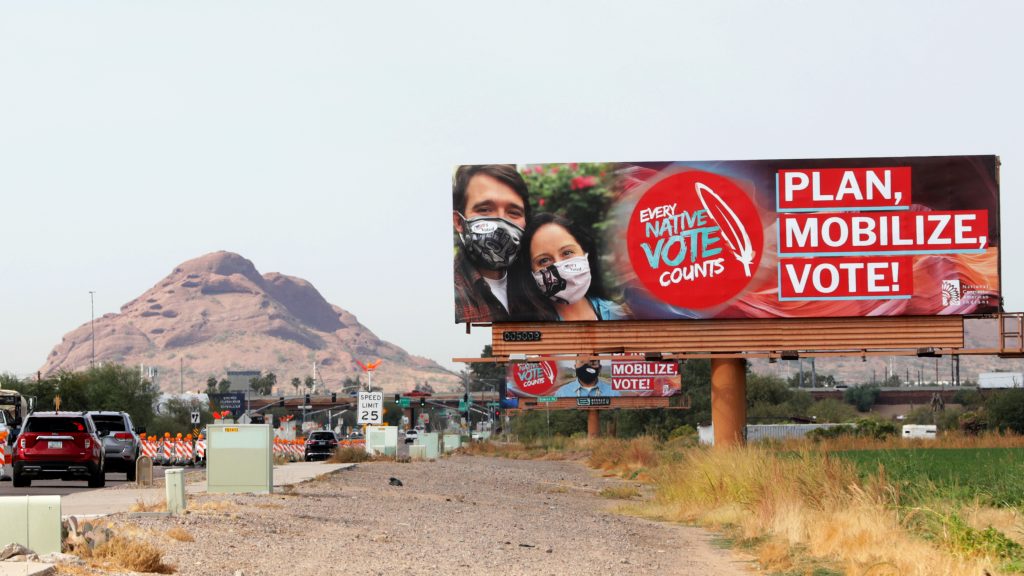
Redistricting
The State is wrapping up its redistricting efforts, and the Arizona Independent Redistricting Commission will finalize the legislative and congressional maps early next week. Native Vote Fellow Blair Tarman-Toner (’21) tracked the Commission’s deliberations over the course of its 14 decision-making meetings, as well as tracked the public comments made at 32 public hearings. Tarman-Toner also regularly presented to tribes on the redistricting process, assisted tribes in drafting public comments, and submitted oral and written comment regarding the importance of complying with the Voting Rights Act and maintaining a strong Native American majority-minority district.
2022 Legislative Session
The Indian Legal Clinic has kicked off its Native Vote policy project with the start of the legislative session this week. The project will focus on tracking bills that impact voting and keeping tribes informed and involved regarding how those bills will impact their tribal members. The clinic will also work with other voting rights organizations through the Arizona Voting Rights Defense Coalition. Native Vote Fellow Torey Dolan (’19) serves on the Coalition’s Coordinating Committee that manages the broader Coalition.
____
Blair Tarman-Toner (’21)
Native Vote Fellow, Indian Legal Program, ASU Law
Job Opportunity: Staff Attorney
The ACLU seeks applicants for the full-time position of Staff Attorney in the Racial Justice Program of the ACLU’s National office in New York, NY or Remote.
The Racial Justice Program (RJP) is part of the ACLU’s Trone Center for Justice and Equality, and works on a broad range of racial justice issues.
See full job posting.
ILP Family legacy
Native American Heritage Month
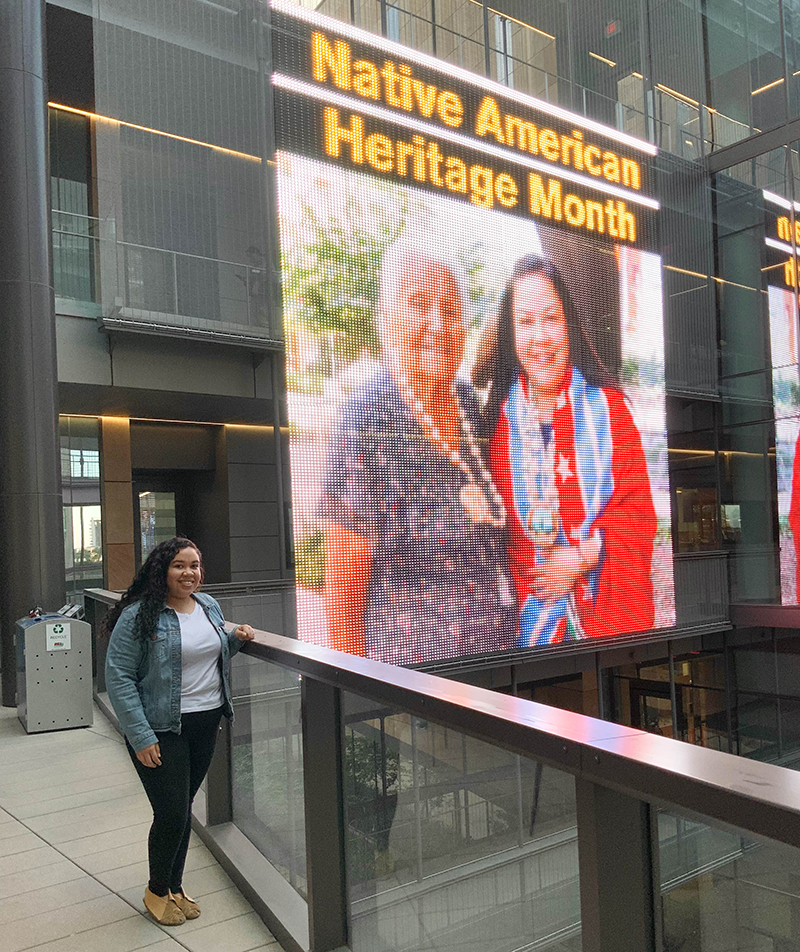
As a team representing 10 tribes at the Sandra Day O’Connor College of Law, the Indian Legal Program aims to educate and celebrate on the ancestral lands of the Akimel O’odham. The program was established 33 years ago by the efforts of two ASU Law students – Gloria Kindig (’89) and LynDee Wells (’89). Over the years, we have excelled and built on that vision and created the Indian Legal Clinic, the Arizona Native Vote Election Protection Project, the Indian Wills Clinic, the Pathway to Law Initiative, the Rosette LLP American Indian Economic Development Program, and the Indian Gaming and Tribal Self-Governance programs.
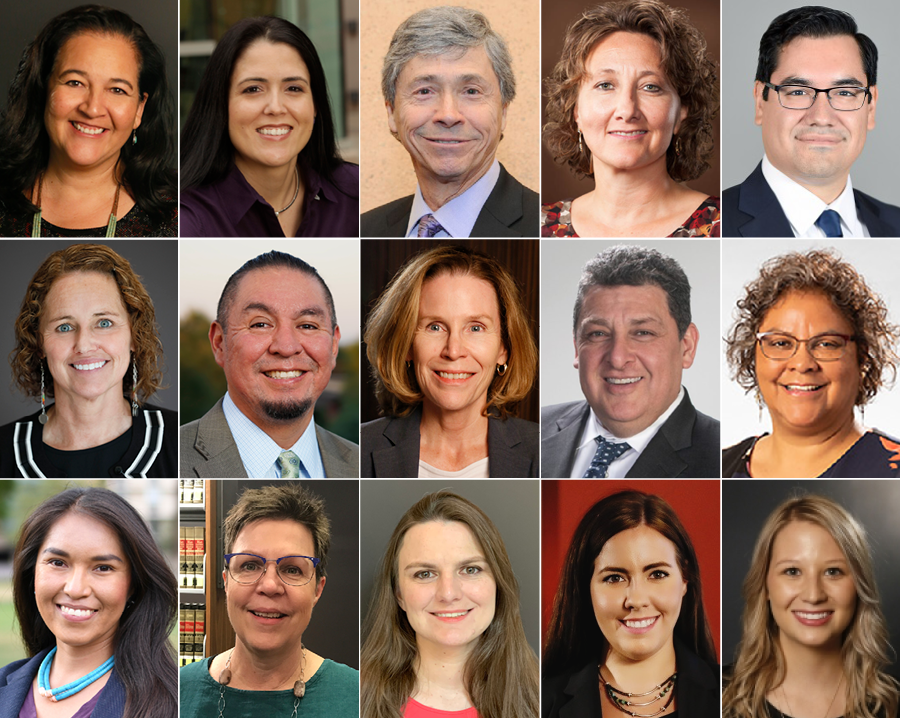
- Kate Rosier (Comanche), ILP Executive Director and Assistant Dean of Institutional Progress
- Patty Ferguson-Bohnee (Pointe-au-Chien), ILP Faculty Director and Indian Legal Clinic Director
- Professor Robert Miller (Eastern Shawnee), Willard H. Pedrick Distinguished Research Scholar and Director of the Rosette LLP American Indian Economic Development Program
- Professor Stacy Leeds (Cherokee), Foundation Professor of Law and Leadership
- Professor Trevor Reed (Hopi), Associate Professor of Law
- Professor Ann Marie Bledsoe Downes (’94) (Winnebago Tribe of Nebraska), Professor of Practice and Director of the Indian Gaming and Tribal Self-Governance Programs
- Professor Derrick Beetso (’10) (Navajo), Director of the Indian Gaming and Tribal Self-Governance Programs
- Professor Helen Burtis (’07), Faculty Associate
- Professor Lance Morgan (Winnebago Tribe of Nebraska), Faculty Associate
- Professor Pilar Thomas (Pascua Yaqui Tribe of Arizona), Faculty Associate
- Danielle Williams (Navajo), Program Coordinator Sr
- Theresa Beaulieu (Stockbridge-Munsee), Program Coordinator
- Honore Callingham (’18), Senior Specialist, Indian Legal Clinic
- Torey Dolan (’19) (Choctaw Nation of Oklahoma), Native Vote Policy Fellow, Indian Legal Clinic
- Blair Tarman (’21) (Chickasaw), Native Vote Policy Fellow, Indian Legal Clinic
In addition to the JD program, we also offer a Master of Laws (LLM) program and Master of Legal Studies (MLS) program.

- Paul Spruhan, Faculty Associate
- Jay Spaan (Cherokee), Faculty Associate
- Michael Hoenig, Faculty Associate
We’ve expanded our presence in Nebraska, California and Washington, D.C. We are a growing network because law is a growing field. Over 375 ILP students have graduated from ASU Law and over 150 received a certificate in Indian Law.
Today, we are proud to have 72 students representing 36 tribes: 44 JD, 1 LLM and 27 MLS.
To our entire ILP family: Happy Native American Heritage Month!
Performing Estate Planning in Indian Country
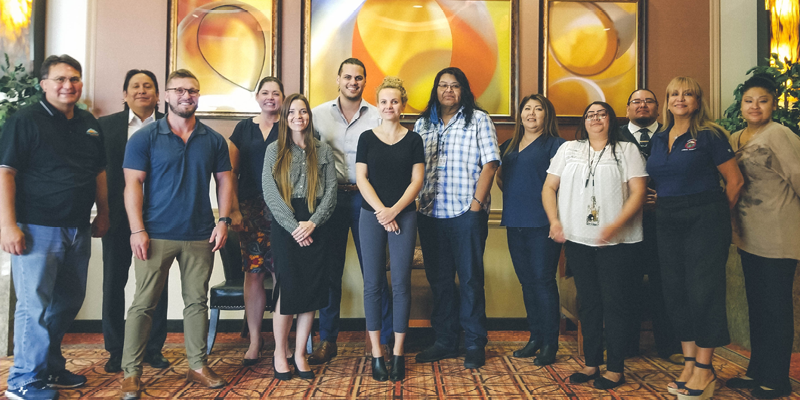
The Indian Legal Clinic successfully and safely completed two in-person Indian Wills Clinics with Quechan Indian Tribe and Pechanga Band of Luiseño Indians. Under the direction of Professor Helen Burtis (’07), 3L student attorneys Jacob Broussard, Liliana Elliot, Lindsay Ficklin, Zaine Ristau and Dwight Witherspoon drafted estate planning documents that are designed to provide allotment owners with wills that conform to the provisions of American Indian Probate Reform Act. The past few years have highlighted the need for elders especially to execute Indian wills.
In September, the clinic executed 14 wills for members of the Quechan Indian Tribe near Yuma, Arizona. In October, the clinic executed 16 wills for members of the Pechanga Band of Luiseño Indians in Temecula, California.
Students appreciated the hands-on experience with Native American clients, especially being able to interact with clients in person again, albeit with safety precautions. “I find doing the Wills Clinic really rewarding,” said Elliott. “I learned a lot that I think will be helpful as a future Indian Law attorney.”
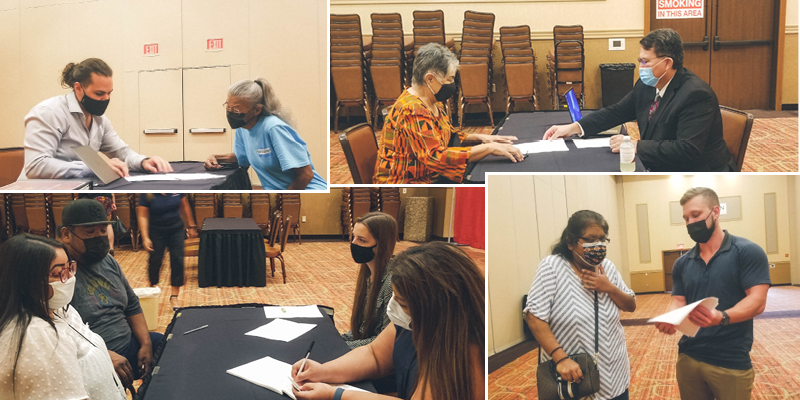
Witherspoon added, “I appreciate working with Native American clients and assisting them with their allotments that pertain specifically to Native American clients in addressing their estate planning needs.”
We appreciate the tribes for their generous hospitality and hosting the Indian Wills Clinic at their facilities. The clinic is planning additional Indian Wills Clinics for next semester.
